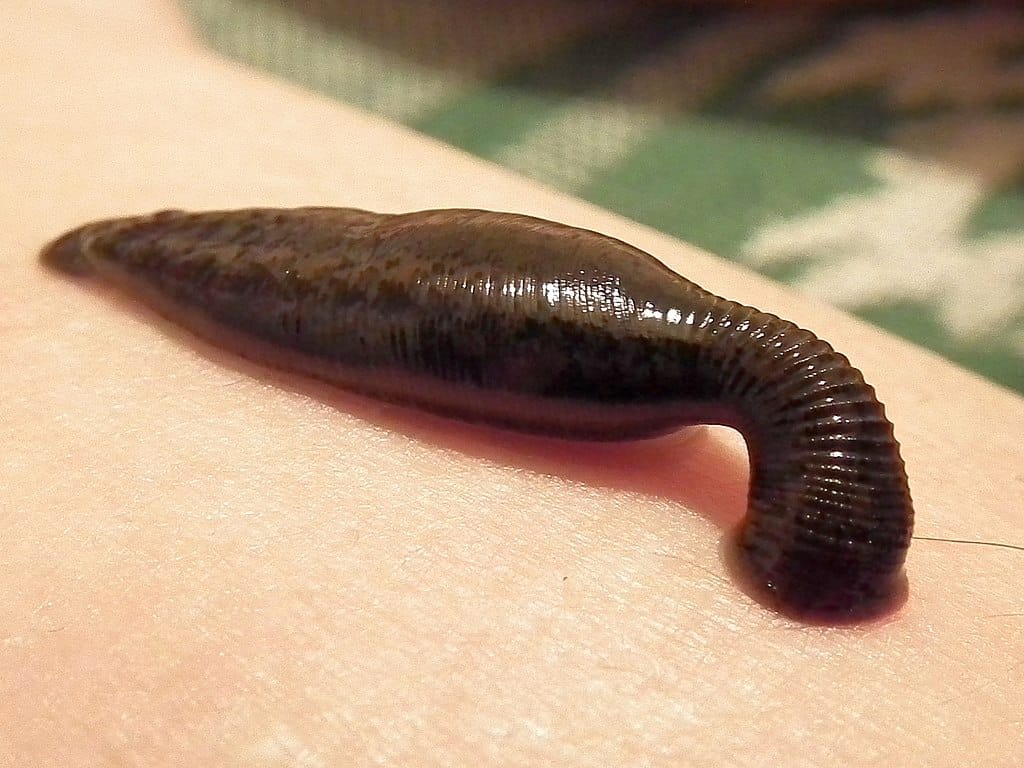leech

Leeches are a type of parasitic worm that suck blood from larger animals. But the word also has an obsolescent meaning of physician or healer. These two meanings may be related—because physicians used to use leeches for bloodletting—or they may come from separate roots. If they are related, they come from the Proto-Germanic root *lekan-, meaning to leak or drip. But the physician sense may not be etymologically related to the worm sense, coming instead from the Proto-Celtic *legio-, which gives us the Old Irish liaig or doctor. If that is the case, the two words only later became popularly associated through the practice of doctors using leeches.
(Note that present-day medicine still uses leeches in skin grafts and limb reattachment, where the anticoagulant secretions of leeches promote the reconstruction and growth of veins and capillaries. Of course, the leeches used today are specially bred for the purpose and are free of pathogenic bacteria.)
The Old English læce, meaning the blood-sucking worm, appears only a handful of times in the extant Old English corpus and then only in glosses of the Latin sanguisuga or hirudo. But the word meaning physician or healer appears some 225 times.
One use of læce to mean physician appears in an interlinear gloss of the Latin hirudo, demonstrating that the association of physicians with the worms was already in place by the late ninth century. The gloss is of Abbo of Saint-Germain-des-Prés’s De bellis Parisiacæ urbis (About the Wars of the City of Paris), a poem about the spiritual and practical implications of the Viking siege of the city in 885–86.
Sy gelomlic læce mid syðegod þær þær bið untrum hiwræden.
(Let the leech often be near the infirmary.)
A more typical Old English use of the word to mean physician can be seen in another ninth-century text, the Old English translation of Gregory the Great’s Cura pastoralis:
Forðæm nan mon ne bitt oðerne ðæt he hine rære, gif he self nat ðæt he afeallen bið; ne eac se, se his wunde sar ne gefret, ne wilnað he nanes læces.
(Because no one asks another that he be lifted up, if he does not know himself that he has fallen; nor does one how does not feel the pain of his wound desire a leech.)
The verb to leech, meaning to heal, appears in the late twelfth century. But the metaphorical extension of the verb, meaning to act like a parasite or to drain someone of money, energy, etc. doesn’t come until much later. Here is a transitional use that directly alludes to the bloodsucking creature. From Columbia, South Carolina’s The State of 9 January 1920:
The bankers, the merchants, and the manufacturers, the preachers and the teachers of the South, indeed every other man who is not a cotton gambling bear leeching the life blood of the cotton grower should be interested in the organization and its work.
And here is one that dispenses with the direct reference to the worm: From a letter published in the Dallas Morning News of 11 August 1925:
As proof there now exists a heavy differential rate on top of the common rate collected by the railroads from Quanah to Roaring Springs, from Plainview to Floydada, from Lubbock to Crosbyton, for long years borne and paid by the people. There was differential for Spur on the Stamford & Northwestern Railroad, which leeched the people for twelve years.
Sources:
Dictionary of Old English: A to Le, 2024, s.v. læce, n.1, læce, n.2.
“Edmonds Praises Work of Body.” The State (Columbia, South Carolina), 8 January 1920, 5/5. Readex: America’s Historical Newspapers.
Fulk, R. D., ed. The Old English Pastoral Care. Dumbarton Oaks Medieval Library 72, Cambridge: Harvard UP, 2021, chap.58, 490.
Kroonen, Guus, ed. Etymological Dictionary of Proto-Germanic Online, Brill, 2009, s.v. *lekja-, *lekan-.
Middle English Dictionary, 4 March 2025, s.v. lechen, v.(2).
Oliver F. N. “Thinks Differentials Should be Removed” (letter). Dallas Morning News (Texas), 11 August 1925, 12/7. Readex: America’s Historical Newspapers.
Oxford English Dictionary, second edition, 1989, s.v. leech, n.1, leech, n.2, leech, v.1; Additions Series 1997, s.v. leech, v.2.
Stevenson, W. H. “Liber Abbonis Anglice Interpretatus.” Early Scholastic Colloquies. Anecdota Oxoniensia: Mediaeval and Modern Series, Part 15. Oxford: Clarendon Press, 1929, 108. Archive.org.
Photo credit: GlebK, 2011. Wikimedia Commons. Licensed under a Creative Commons Attribution-Share Alike 3.0 Unported license.